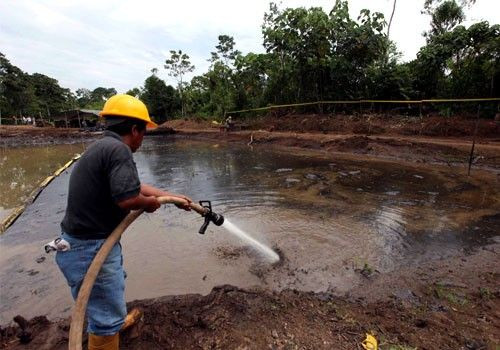Chevron fined record $9.5 bln for polluting Ecuador, calls verdict product of fraud

U.S. oil giant Chevron Corp. said it will challenge the ruling of an Ecuadorean judge who has ordered it to pay a record $9.5 billion fine after holding it responsible for polluting a wide swath of Amazon rainforest in Ecuador from 1972 to 1992 while it operated in a consortium with state-run Petroecuador.
The judgment that was announced on Monday concludes an 18-year old fight the forest tribal people have been waging against the American corporate behemoth. The lawsuit was brought on behalf of 30,000 people whose health and environment were allegedly damaged by chemical-laden waste water dumped by Texaco's operations from 1972 to 1990. Chevron bought Texaco in 2001.
Even as lawyers for the residents of Amazon rainforest are celebrating the verdict and various environmental groups are calling it a triumph of justice over Chevron's crime and economic power, Chevron said the ruling is illegitimate and unenforceable and it will appeal the decision. The oil giant claims the plaintiffs in the lawsuit are trying to extort tens of billions of dollars from the company by fabricating evidence against it and rigging the Ecuadorean legal system.
It (the verdict) is the product of fraud and is contrary to the legitimate scientific evidence. Chevron will appeal against this decision in Ecuador and intends to see that justice prevails, Chevron, which made $19 billion in net profit last year and whose $195 billion market valuation is more than three times the size of Ecuador's annual economic output, said in a statement.
Incidentally, damage estimate were initially put at $16 billion and then climbed to $27 billion and most recently was pegged at $113 billion. Chevron has alleged that the report based on which the damage was estimated was a sham and as opposed to being prepared by a court appointed researcher, it was in fact prepared by Steven Donziger, the lead lawyer for the plaintiffs, and his associates, and was relied upon by the court.
However, the Ecuadorean government said the verdict is just and Ecuador's president, Rafael Correa said it was the most important judgment in the history of the country. Ironically, not even Chevron has disputed that Texaco (now owned by Chevron) did in fact pollute large swaths of the Amazon rainforest in the 1970s while exploring for oil.
Judge Nicholas Zambrano of Nueva Loja court in Lago Agrio, who ruled against Chevron, said the oil giant must pay $5.4 billion to restore the polluted soil and $1.4 billion to create a health system for the affected community, among other penalties. Zambrano also ruled that Chevron should pay the Amazon Defense Front, a coalition formed by the plaintiffs, an additional 10 percent in damages, or about $860 million. That could bring the total judgment to $9.5 billion.
Zambrano has given the oil giant 60 days to set up an escrow account in Ecuador through which the damages would be distributed.
However, with Chevron vowing to appeal the verdict, the case could run for several more years before the plaintiffs see any money.
The judgment came even as an international arbitration panel in The Hague ordered Ecuador to take all measures at its disposal to suspend or cause to be suspended the enforcement or recognition within and without Ecuador of any judgment against Chevron in the case. Chevron has continuously claimed that Ecuador was violating the terms of a 1997 trade pact with the US.
United States and international tribunals already have taken steps to bar enforcement of the Ecuadorian ruling. Chevron does not believe that (the judgment) is enforceable in any court that observes the rule of law. Chevron intends to see that the perpetrators of this fraud are held accountable for their misconduct, the oil giant said.
Last week, Judge Lewis Kaplan of New York's Southern District Court also imposed a temporary restraining order on the plaintiffs' US lawyers, effectively blocking enforcement of ruling against Chevron.
Legal experts say the moot point is whether Chevron should still be held responsible for the cleanup especially when Chevron itself has been out of the country in all ways since 1992.
Moreover, Chevron says Texaco spent $40 million cleaning up the area during the 1990s, and had signed an agreement with the Ecuadorean government in 1998 absolving it of any further liability.
The oil giant also claims the oil pollutions in question were created by Texaco's former oil exploration partner and Ecuador's state-run oil company Petroecuador, which has a deplorable environmental record.
© Copyright IBTimes 2024. All rights reserved.





















